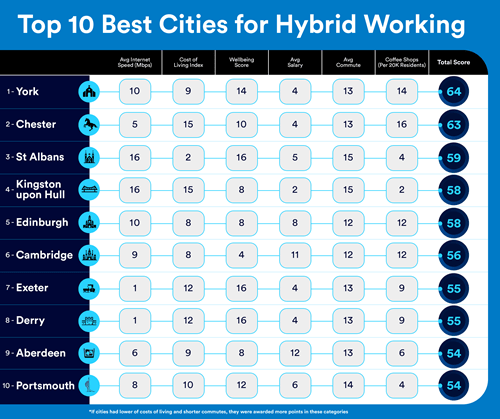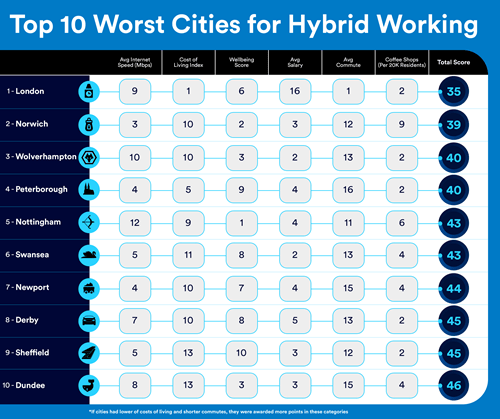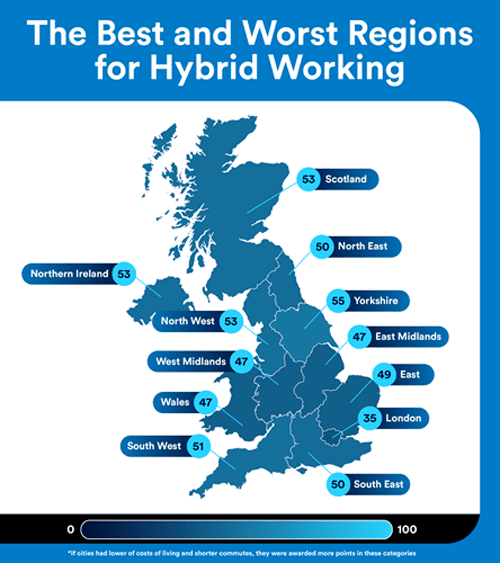
The best and worst UK cities for hybrid working
Whether these businesses will opt for working from home full time or hybrid working - where employees split their time between home and the office - remains somewhat unclear at this point. For some, a return to pre-pandemic office life is on the cards, but for others, there's simply no going back to the way things were.
Nevertheless, the demand is certainly there; an overwhelming 85% of UK workers want a hybrid approach to working going forward. And it seems that some employers agree.
According to CIPD Research, 40% of employers expect more than half their workforce to regularly work from home after the pandemic had ended. Given that 50% of C-Suite Executives expect their employees to be in the office between 1-4 days a week, a hybrid future could well be inevitable.
Clearly, it's a topic that's high on the national agenda right now. That's why we wanted to investigate things a little further by looking into which UK cities are the best and worst for hybrid working.
What did we do?
To find out which UK cities are the best and worst for hybrid working, we ranked each major UK city on an index made up of six factors that contribute to the lifestyles of the flexible professional:
- Cost of living
- Wellbeing (average ratings of life satisfaction, happiness, and anxiety)
- Commuting time (minutes)
- Average salary (£)
- Average Internet Speed (mbps)
- Coffee shops per capita
By rating each city on these criteria, we were then able to create an overall Hybrid Working Score (out of 100) to produce a full ranking of every city from best to worst.
The UK’s best cities for hybrid working

When it came to the overall best city for hybrid working, York came out on top. Helped along by a moderate cost of living, a respectable standard of wellbeing and a lower average commute, the cathedral city scored an overall hybrid working score of 64, one point higher than second-place Chester.
As for the city where its inhabitants are the happiest, Exeter took the top spot for overall wellbeing, closely followed by St. Albans. Alongside Hull, St. Albans also took joint first when it came to the highest average internet speeds (138 mbps), somewhat surprising given both cities' relatively small sizes. Nevertheless, a speedy Internet connection is most definitely a big plus while working from home.
The UK's worst cities for hybrid working

With a hybrid working score of just 35, London is the UK's worst city for hybrid working, despite employers in the capital being among the first to make the switch. Although its average salary was far higher than other cities in the top 10, its longer average commute and higher cost of living brought its hybrid working score way down.
Along with London, which averaged a commute time of 66 minutes, employees in Nottingham and Leeds also deal with high commutes of 41 and 40 minutes respectively. Interestingly, 36% of employees would consider moving to a different area of the country for the ability to work from home. And when they have a long commute to endure with limited flexible working options, it's easy to see why.
Likewise, a move might be on the cards if you live in a city such as Newcastle, which receives the dubious honour of scoring the lowest rating for overall wellbeing. And for anyone who's had to deal with the frustrations of slow internet speeds while WFH, spare a thought for those living in Exeter and Worcester, who must put up with an average internet speed of 50 mbps and 47 mbps, respectively.
The UK’s best and worst regions for hybrid working

As far as the best region in the UK for hybrid working, Yorkshire is number one with an average hybrid working score of 55, while the North West came in second. London was by far deemed the worst with a score of 35, a whole 12 points below Wales, which was the second-worst hybrid working region in the UK.
As for those in Chester, who like some caffeine with their 9 to 5s, the area has the highest number of coffee shops per capita, with 11 per 20,000 residents. If you need to host an impromptu Zoom call or just grab a cappuccino when you're on the go, then Chester is the place to be.
As for speedy internet, Yorkshire takes the top spot for fastest average internet speed overall with 85 mbps, closely followed by the East at 82 mbps. Northern Ireland and Wales, on the other hand, tie for being the regions with the slowest internet connections at 61 mbps.
Energy consumption calculator
If you would like to better understand the energy consumption costs attached to your business’s own hybrid working circumstances, our energy consumption calculator can provide those insights.


